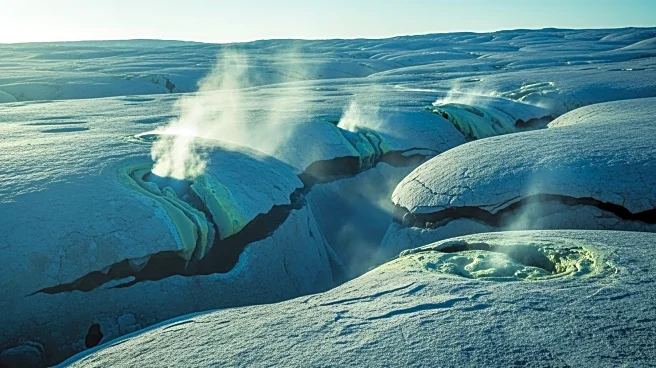What is the story about?
What's Happening?
The UN's climate chief, Simon Stiell, has emphasized the potential of artificial intelligence (AI) in addressing the climate crisis, while also highlighting the need for government regulation of the technology. AI is being utilized to enhance energy efficiency and develop tools to reduce carbon emissions from industrial processes. Despite its benefits, concerns have been raised about the significant energy demands of large data centers, prompting calls for regulatory action. Stiell advocates for AI's role in driving real-world outcomes, such as managing microgrids and mapping climate risks. He also noted the global alignment with the Paris Agreement, with renewable energy investments increasing significantly over the past decade.
Why It's Important?
The integration of AI in climate action represents a significant opportunity for technological advancement in environmental sustainability. By optimizing energy systems and reducing carbon emissions, AI can contribute to a more efficient and resilient global energy landscape. However, the need for regulation underscores the importance of balancing technological innovation with environmental responsibility. The uneven distribution of benefits from the clean energy transition highlights the necessity for inclusive policies that ensure widespread access to these advancements. The ongoing commitment to the Paris Agreement, despite political challenges, reflects a global consensus on the urgency of climate action.
What's Next?
Governments are expected to produce updated national plans for reducing greenhouse gas emissions, known as nationally determined contributions (NDCs), ahead of the upcoming Cop30 climate summit in Brazil. This summit will focus on the next decade of climate action, with major economies like the EU, China, and India yet to submit their plans. The extension of the deadline for NDC submissions indicates a push for accelerated progress in climate commitments. The summit will serve as a platform for reaffirming global support for the Paris Agreement and enhancing international cooperation in climate initiatives.
Beyond the Headlines
The discussion around AI and climate action raises ethical considerations regarding the equitable distribution of technological benefits. As AI becomes more integrated into climate strategies, it is crucial to address the potential disparities in access and impact across different regions and communities. The role of AI in climate diplomacy also highlights the intersection of technology and international relations, suggesting a shift towards more data-driven and collaborative approaches in global environmental governance.
















